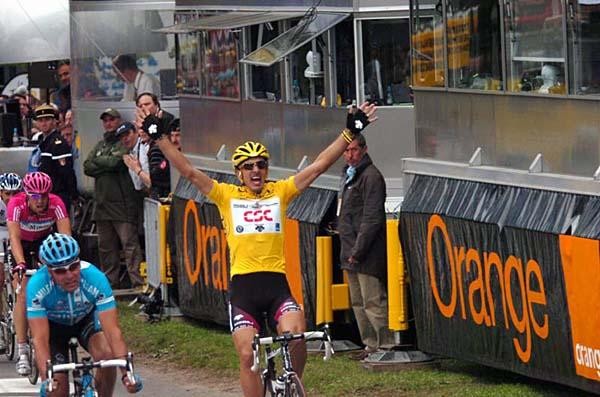The autobus
The tough mountain stages split up the peloton every time into a lot of smaller groups which...

The tough mountain stages split up the peloton every time into a lot of smaller groups which eventually combine to the gruppetto or, if you are in France, the autobus. It's a large group driven by a common interest, arriving at the finish inside the time limit, which is a percentage off the winner's time. The percentage value used varies with terrain and difficulty as well as the winner's average time.
The Tour rules offer different percentage tables, called coefficients, depending if it's a mountain stage, a flat stage or even if accidents were involved. In yesterday's stage coefficient three was used - a stage with 'grand difficulté'. At the average speed obtained, 35.160 km/h, it was 13 percent off the winning time of 5 hours 34 minutes and 28 seconds or 43'29". Yesterday the autobus was in a hurry and despite last-placed man Wim Vansevenant of Predictor-Lotto telling Cyclingnews before the start that he expected it to be the toughest stage in the Tour, the gruppetto made it 35'45". In fact Vansevenant was in the next to last group, which came in almost four minutes earlier.
The reason for forming a large group is simple. If 20 percent or more of the riders are outside the time limit the organisers may decide to augment the time limit. There is also an unwritten rule that riders are let through the cracks if they had an unfortunate accident, but it does seem to be a rule that is mostly applied to French riders, such as Geoffroy Lequatre (Cofidis) in stage 5. It always helps to have a leader, and Mario Cipollini, the outspoken Italian who got more than one rule changed, was a master at it. He had the charisma to gather the fellow sprinters early and make everyone have a relatively relaxed ride up to the finish.
The ride isn't free, but certainly easier, said Erik Zabel on his team's web site, team-milram.com. "Altogether it was more relaxed to be in the gruppetto at a mountain stage, than to do a sprint stage," the 37 year-old conceded. Zabel is one of the best climbers of the sprinters and can easily make the time cuts, but he often prefers to gather the fellow sprinters and save energy.
The German continued that "the sprint stages were pure stress, needing constant concentration." So he prefers to spend time with the big group at the end of the race, where it's almost like a community. Riders help each other out with food, drinks and even fixing minor defects.
The latest race content, interviews, features, reviews and expert buying guides, direct to your inbox!